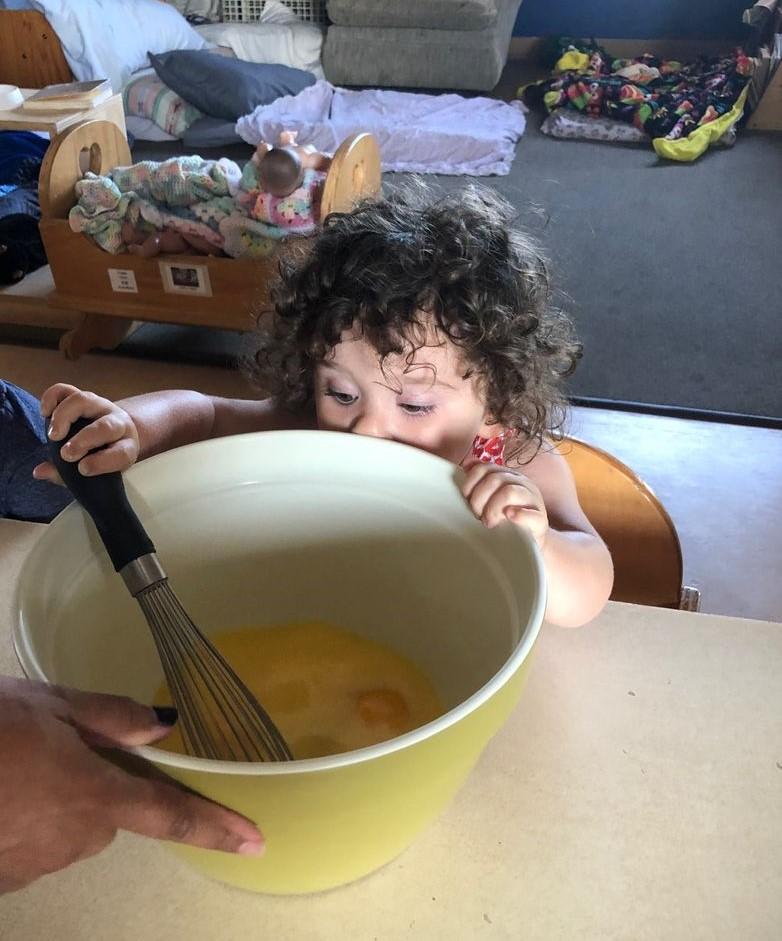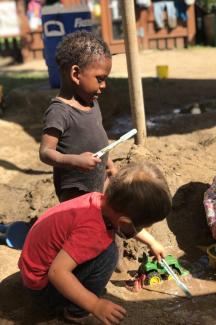
ECCES serves our toddlers (24 months to 2 years+) in two centers at UCSB, the Orfalea Family Children's Center (OFCC) on West Campus and the University Children's Center (UCC) at the Student Resource Building on the main campus.
The toddler program Is inspired by Magda Gerber's Resources for Infant Educarers (RIE) philosophy that promotes treating children with respect and as individuals. It honors infants and young children as equal partners in relationships to promote effective bonding and attachment while incorporating a deep respect and appreciation of the child. This approach encourages toddlers and adults to trust each other, learn to problem solve, and embrace their ability for self-discovery.
We provide many opportunities for the children to receive individual and nurturing attention from the teaching staff as they develop their self-help skills into becoming autonomous individuals. Toddlers are given opportunities to participate in activities that include sensory play, art, music, gardening, small group times for stories and songs, manipulatives, simple cooking projects, dramatic play, and outside play including walks around the Centers. Toddlers grow in their abilities to come together as a group. They begin to seek out behaviors and actions that will help as they become increasingly interested in engaging with peers as opposed to adults. Teachers plan curriculum based on children's interests and developmental needs and provide an indoor and outdoor environment that promotes self-concept, independence, and exploration.
For questions regarding the Infant program:
The Orfalea Family Children's Center: Jenny Greaney, Infant/Toddler Program Coordinator, at 805-893-4904 or via email jennyd@ucsb.edu
The University Children's Center: Marina Nolte, Infant/Toddler Program Coordinator, at 805-893-7818 or via email mnolte@ucsb.edu
Frequently Asked Questions
Full time: Monday - Friday
Part time: Monday/Wednesday/Friday or Tuesday/Thursday
1:4 with a maximum of 13 toddlers in a room with 3 - 4 adults depending on how many children are in attendance for the day.
Please see our Programs & Curriculum Overview page for more information about Meals and Nutrition
Toddler Food Guidelines
For toddlers, all foods need to be cut lengthwise and into pieces no larger than 1/2 square inch.
It is the parent's responsibility to provide diapers for their child. Each child has their own clearly labeled cubby to hold their change of clothes, diapers, etc. Diapers are visually inspected at least every two hours, when a child wakes from a nap, and whenever the child indicates discomfort or exhibits behavior that suggests a soiled or wet diaper. The diaper changing mat is cleaned and disinfected between each diaper change, and hand washing of the childcare provider and child is performed after each diaper change.
Toilet learning is a big part of the daily toddler learning curriculum. Teachers will work with families and individual children on toilet learning skills. Toddler and preschool classrooms have access to a bathroom that meets licensing standards for young children.
Toilet learning will not be coerced. The individual developmental abilities of each child will be considered. Children will not be punished emotionally or physically for soiling, wetting, or not using the toilet. Families will provide sufficient extra clothing for their children to change into in the event of a toileting accident. Any extra clothes that are worn home should be replaced the following day.
Families will be kept advised of their child's progress on a regular basis according to family wishes. Families will work together with their child's teachers to support their child in the toilet learning process.

Routine and Schedule of Daily Activities
Teachers work to create a balanced daily schedule, giving the children opportunities to build relationships with their peers and the staff as well as explore in a safe and warm environment. The schedule includes indoor and outdoor free play, time to refuel during meal times and rest times, and teacher-directed activities such as group time throughout the day. Providing a consistent schedule for the children enables them to anticipate what will happen next and feel more secure in their learning and exploration.
Toddler Daily Schedule (2 - 3 years)
Arrival
7:30-8:30 - Children and their parents arrive and are greeted by the teachers. After washing their hands, the children are encouraged to engage in activities provided by the teachers or read a story with their parents. As the children transition into their school day, the teachers help them say goodbye to their parents.
Free Play
8:30-9:30 - Children are given the opportunity to explore classroom materials and engage in activities planned by the teachers. The teachers plan lessons based on children's interests and where they are developmentally. Activities include looking at books, art, sensory materials, dramatic play, blocks, etc. The activities offered are meant to be challenging and promote learning in all areas of development (cognitive, physical motor, social emotional, language). The children have the freedom to choose which activities they engage in and for how long.
Clean Up and Group Time
9:30-9:45 - The children help the teachers clean up the play space and join the teachers for group time. Group time is a more structured, teacher-directed large group activity consisting of reading stories, singing songs, and doing fingerplays.
Diapering, Toileting and Handwashing
9:45-10:00 - Change diapers, give children opportunity to use the toilet and wash hands in preparation for morning snack.
Morning Snack
10:00-10:30 - Children gather together to have snack. During this time the children and adults have the opportunity to have conversations about what the children have done during the morning. The conversations give the children a chance to practice their language skills with their peers and the adults in the classroom.
Outdoor Play
10:30-11:45 - Children are given the opportunity to practice large and fine motor skills as they explore the outdoor environment. The play yard is set up with art and sensory activities for small groups of children to play with during this time. Children can play in the sandbox, ride tricycles and scooters, and explore the large climber. Teachers often plan gardening activities as well as group walks in the areas around the Centers.
Lunch
11:45-12:30 - Lunch routines for toddlers focus on their increasing competencies as they sit with their peers to eat. Small groups of children sit together at tables, giving the an opportunity to practice social skills.
Nap
12:45-2:30 - After lunch, children get diapers changed and/or use the toilet, wash their hands and lie down on their mats for nap time. The children can look at books while listening to soft, relaxing music as they get ready to sleep. The teachers dim the lights in the room and sit next to the children to rub their backs if needed. Children are able to do quiet activities as they wake up from their nap.
Afternoon Play
2:30-3:15 - Children and teachers engage together in small group and one-on-one activities as the afternoon progresses. This gives children another chance to practice language and social skills. The group will once again clean up the play space and sit together for a short group time with stories and songs.
Afternoon Snack
3:15-3:30 - Children wash their hands and sit together to have a nutritious snack to fuel the rest of the afternoon.
Outdoor Play and Departure
3:30-5:20 - Children explore the play yard together as they play with water, sand, and use push toys and balls. As they get ready to go home for the evening, they spend time building friendships and learning how to negotiate and share toys as well as learning how to work together to solve conflicts over space and toys. Parents touch base with the teachers at pick up time, getting information about their child's day.
*This schedule are flexible and may change according to a child's individual needs as well as the groups' needs and interests.



